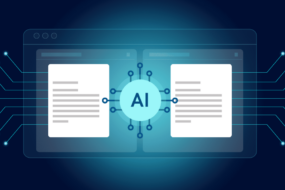
In the ever-evolving landscape of data management, businesses are facing the growing challenge of safeguarding their invaluable assets. The era of traditional backup methods is gradually giving way to a more intelligent approach – AI-driven backup strategies. This transformative shift not only ensures data protection but also streamlines the entire backup process. In this comprehensive guide, we delve into the intricacies of AI-powered backup solutions and how they are becoming the cornerstone of modern data security.
Unveiling the Power of AI in Backups
In a realm where data is king, AI emerges as the sentinel guarding the kingdom. Unlike conventional backups, AI-driven strategies leverage machine learning algorithms to adapt and optimize the backup process dynamically. This adaptability ensures that backups are not only efficient but also aligned with the evolving nature of data structures.
Understanding the Core Mechanism
At the heart of AI-driven backups lies a sophisticated mechanism that goes beyond mere replication. Machine learning algorithms analyze data patterns, allowing the system to discern critical from non-critical information. This intelligent filtering not only reduces storage needs but also enhances the speed of backup processes.
The Key Components of AI-Driven Backup Solutions
To harness the full potential of AI in backups, understanding the key components is crucial.
Data Recognition and Classification
AI algorithms excel in recognizing and classifying diverse data formats. From structured databases to unstructured content, the system ensures that every piece of information is appropriately categorized, streamlining the backup process.
Predictive Analytics for Backup Optimization
By analyzing historical data patterns, AI predicts future backup needs. This proactive approach minimizes the risk of data loss and ensures that critical information is always backed up in a timely manner.
Automated Decision-Making
AI-driven backup solutions don’t just stop at recognition; they make informed decisions autonomously. This includes selecting the most suitable storage location, scheduling backups during low-activity periods, and adjusting parameters based on real-time data analysis.
Backups Redefined: The Advantages of AI Integration
The integration of AI in backup strategies brings forth a myriad of benefits that go beyond traditional methods.
Enhanced Security Measures
AI algorithms actively identify potential vulnerabilities, reducing the risk of data breaches. By continuously monitoring for anomalies, these systems fortify data protection measures.
Streamlined Recovery Processes
Traditional backups often entail time-consuming recovery processes. AI-driven strategies optimize this aspect, ensuring faster and more efficient data restoration, minimizing downtime.
Cost-Efficiency through Smart Resource Allocation
By intelligently managing storage resources, AI-driven backups eliminate unnecessary costs associated with over-provisioning. This resource optimization results in a more cost-effective data protection strategy.
Common Concerns Addressed: AI-Driven Backups Demystified
While the advantages are evident, concerns around AI-driven backups are natural. Let’s address some common queries:
Can AI Adapt to Unique Data Structures?
Absolutely. The adaptive nature of AI allows it to understand and adapt to diverse data structures, making it suitable for any business environment.
What About Data Privacy and Compliance?
AI-driven backup solutions prioritize data privacy. They adhere to stringent compliance standards, ensuring that sensitive information is handled with the utmost confidentiality.
Is the Implementation Complex?
While the integration of AI may seem complex, modern solutions come with user-friendly interfaces, making implementation straightforward for businesses of all sizes.
How Does AI Handle Massive Data Sets?
AI’s scalability is a significant asset. It efficiently manages massive data sets by distributing resources intelligently, maintaining optimal performance.
Can AI Predict Data Recovery Times?
Indeed, predictive analytics enable AI to estimate data recovery times accurately, allowing businesses to plan and mitigate potential disruptions effectively.
Final Words: Navigating the Future of Data Protection
As we navigate the complex terrain of data management, AI-driven backup strategies stand as beacons of innovation. By combining the power of artificial intelligence with robust backup protocols, businesses can fortify their defenses against unforeseen challenges. Embrace the future of data protection – where intelligence meets resilience.
Commonly Asked Questions
Q1. How does AI-driven backup differ from traditional methods?
AI-driven backups leverage machine learning to adapt and optimize the backup process dynamically. Traditional methods lack this adaptability and often rely on manual interventions.
Q2. Can AI handle the diversity of data in modern business environments?
Yes, AI excels in recognizing and classifying diverse data formats, making it well-suited for the varied data structures present in modern business environments.
Q3. What measures are in place to ensure data privacy and compliance?
AI-driven backup solutions prioritize data privacy and adhere to stringent compliance standards, ensuring the confidentiality and integrity of sensitive information.
Q4. Is the implementation of AI-driven backups complex?
Modern solutions come with user-friendly interfaces, making the implementation of AI-driven backups straightforward for businesses of all sizes.
Q5. How does AI optimize storage resources to reduce costs?
AI intelligently manages storage resources, eliminating unnecessary costs associated with over-provisioning, leading to a more cost-effective data protection strategy.
Advertisement








